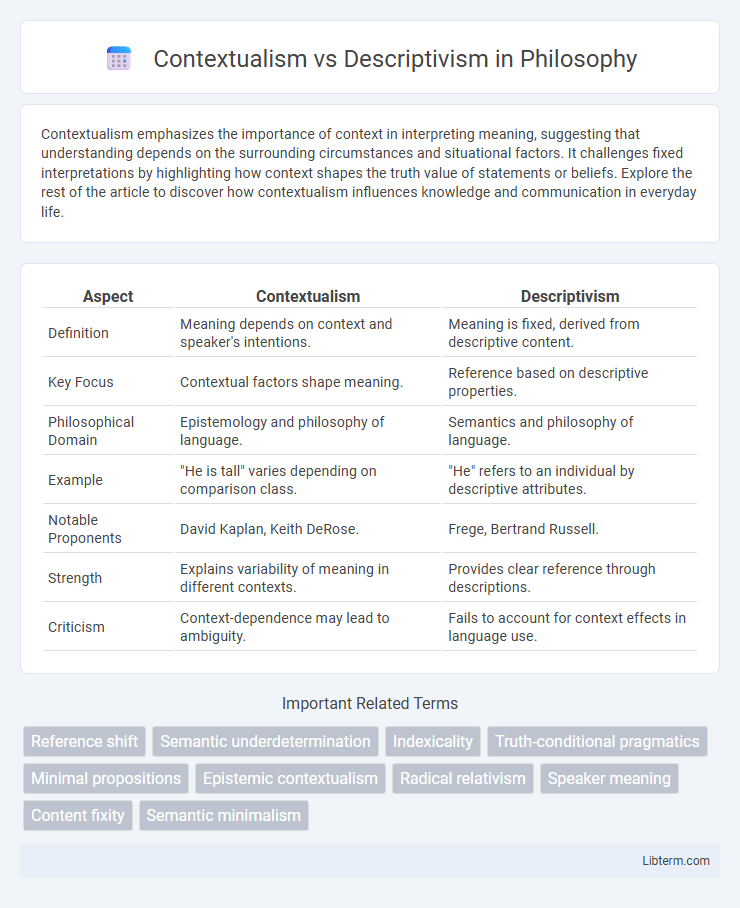Contextualism emphasizes the importance of context in interpreting meaning, suggesting that understanding depends on the surrounding circumstances and situational factors. It challenges fixed interpretations by highlighting how context shapes the truth value of statements or beliefs. Explore the rest of the article to discover how contextualism influences knowledge and communication in everyday life.
Table of Comparison
| Aspect | Contextualism | Descriptivism |
|---|---|---|
| Definition | Meaning depends on context and speaker's intentions. | Meaning is fixed, derived from descriptive content. |
| Key Focus | Contextual factors shape meaning. | Reference based on descriptive properties. |
| Philosophical Domain | Epistemology and philosophy of language. | Semantics and philosophy of language. |
| Example | "He is tall" varies depending on comparison class. | "He" refers to an individual by descriptive attributes. |
| Notable Proponents | David Kaplan, Keith DeRose. | Frege, Bertrand Russell. |
| Strength | Explains variability of meaning in different contexts. | Provides clear reference through descriptions. |
| Criticism | Context-dependence may lead to ambiguity. | Fails to account for context effects in language use. |
Introduction to Contextualism and Descriptivism
Contextualism asserts that the meaning of a statement or expression depends heavily on the context in which it is used, emphasizing the role of speakers' intentions and situational variables in shaping interpretation. Descriptivism, in contrast, holds that the meaning of expressions is fixed and can be fully captured by descriptive content independent of context. These two contrasting theories form the foundation for debates in philosophy of language regarding how meaning and reference are determined.
Historical Background and Philosophical Roots
Contextualism originates from Wittgenstein's later philosophy, emphasizing meaning as use dependent on context, contrasting with Descriptivism rooted in Frege and Russell's theories where reference is fixed by descriptive content. The historical shift from early analytic philosophy's emphasis on fixed sense-reference relations to later pragmatics reflects evolving views on language's role in communication. Philosophically, Contextualism challenges the rigid semantics of Descriptivism by incorporating speaker intentions and situational variables into meaning determination.
Core Principles of Contextualism
Contextualism asserts that the truth-conditions of knowledge claims vary depending on the speaker's context, emphasizing the dynamic nature of meaning influenced by factors such as stakes, standards, and conversational settings. This approach contrasts with Descriptivism, which holds that knowledge claims have fixed truth-conditions independent of context. Core principles of Contextualism include sensitivity to pragmatic factors, context-relative standards for knowledge attribution, and the variability of epistemic assessments contingent on situational nuances.
Fundamental Tenets of Descriptivism
Descriptivism asserts that terms have fixed meanings defined by a set of descriptive properties, enabling stable reference across different contexts. This semantic theory emphasizes that understanding a term involves grasping the associated cluster of descriptions believed to pick out the referent. Unlike contextualism, which allows meaning to shift with contextual factors, descriptivism maintains that meaning is determined by inherent descriptive content rather than external situational elements.
Key Differences: Contextualism vs Descriptivism
Contextualism asserts that the truth value of statements depends heavily on the context in which they are expressed, emphasizing the variability of meaning due to situational factors. Descriptivism, in contrast, holds that statements have fixed truth values based on their correspondence to objective facts, independent of context. The key difference lies in how contextualism allows for dynamic interpretation shaped by speaker intentions and circumstances, while descriptivism advocates for stable, context-independent truth conditions.
Contextualism in Language and Communication
Contextualism in language emphasizes the role of context in interpreting meaning, asserting that linguistic expressions gain significance primarily through situational factors such as speaker intentions, social norms, and environmental cues. This approach contrasts with descriptivism by rejecting fixed, context-independent meanings of words or sentences, highlighting how pragmatic elements influence understanding in communication. Key studies in pragmatics and semantics demonstrate how context-sensitive interpretations facilitate effective interaction and resolve ambiguities inherent in natural language use.
Descriptivism in Linguistic Analysis
Descriptivism in linguistic analysis emphasizes the objective observation and documentation of language as it is naturally used by speakers, rather than prescribing rules or norms. This approach analyzes contextual factors by examining patterns of language use across different social, cultural, and communicative situations without imposing subjective interpretations. Descriptivism provides valuable insights into language variation and change, enabling linguists to capture authentic language behavior for more accurate semantic and syntactic modeling.
Implications for Semantics and Meaning
Contextualism asserts that meaning varies with context, emphasizing the role of speaker intentions and situational factors in semantic interpretation, which challenges fixed truth conditions in language. Descriptivism maintains that words have stable, context-independent meanings based on objective descriptions, supporting a more rigid semantic framework. This tension impacts linguistic theories by influencing how meaning is computed, either dynamically through context or statically via predefined semantic content.
Modern Debates and Criticisms
Modern debates on Contextualism vs Descriptivism center on how meaning is determined by context versus fixed descriptive content of terms. Critics argue Contextualism risks relativism by allowing flexible interpretations that challenge stable reference, while Descriptivism faces challenges explaining how names rigidly refer without descriptive content. Recent philosophical discussions emphasize the interplay between pragmatic factors and semantic content, highlighting tensions in language understanding theories.
Conclusion: Evaluating Contextualism and Descriptivism
Contextualism offers a flexible approach by emphasizing the role of context in shaping meaning, which aligns closely with pragmatic language understanding. Descriptivism provides a more fixed interpretation by relying on predefined descriptions, enabling consistency and clarity in semantic analysis. Evaluating both reveals that contextualism suits dynamic communication scenarios, while descriptivism excels in structured linguistic frameworks.
Contextualism Infographic

 libterm.com
libterm.com